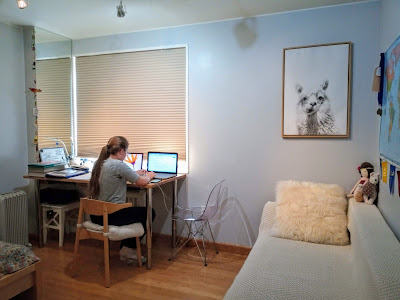Even Bullies Need Friendship by 3rd Grade Student
It was mid-September,
the beginning of a new school year, Hidie and her best friend Olivia were
excited to start the third grade and their new adventures together. As Hidie
and Olivia were walking to their classroom, they were approached by a girl who
teasingly said “Ooo! Two little kindergarteners.” Both girls were offended, but
only Hidie stood up for herself, Olivia was too shy.
Hidie kindly,
but firmly replied, “Firstly, we are not kindergarteners and secondly, if you
are mean to us we might be mean to you.”
“And so what? I
don’t care. Why is your little friend so quiet?” asked the mean girl.
“You should
apologize to her.” Hidie said, as she tried to defend Olivia, but the bully
simply walked away.
“Thank you, you
are a faithful friend, Hidie.” said Olivia
“That’s what
friends are for.” Hidie said, before realizing that they were late. Hidie and
Olivia quickly rushed into the classroom.
“Who was so loud
in the hallway?” asked the teacher, Ms. Thea.
“Y…y…y…we don’t
know.” Stuttered the nervous girls.
“I heard your
voices, but I want you to know that you can always talk to me if you need to.
Anyway, would you girls like to have lunch with me today?” Ms. Thea asked.
“Yes! We would
love to.” replied Hidie and Olivia in unison.
Hidie and Olivia
were very excited because this was their first lunch with Ms. Thea. They
hurried down to the cafeteria to collect some food and returned to the
classroom, laughing and chatting. When Ms. Thea saw the girls return, she
walked them to a different room, a room that they have never been in. She
pointed at the chairs and said, “I sat here with my niece earlier, she is a 4th
grader in this school.”
“We didn’t know
your niece goes to our school! What is her name Ms. Thea?” asked Hidie.
Ms. Thea smiled,
“I will tell you, but first listen to this - you are the best students in this
school, very wise and ambitious. I’m so glad I have you here. I want you to
know that you are my favorite girls. Can you keep it a secret?”
“Of course we
can!” Hidie and Olivia exclaimed.
Just as Ms. Thea
was about to reply, a familiar voice, the voice of the bully that Hidie and
Olivia encountered earlier interrupted. “Well, well, a secret huh?”
“Agatha, You owe
these girls an apology.” interrupted Ms. Thea
“Ms. Thea, how
do you know her name?” Hidie asked.
“Agatha is my
sister’s daughter, my niece.” replied Ms. Thea.
“But Hidie and
Olivia…” Agatha began, “Now Agatha, please don’t disturb our conversation.” Ms.
Thea said, half smiling and half frowning. Agatha walked away with her hands on
her hips and a grimace on her face.
“Thank you, Ms. Thea. We have to go now or we
will be late for our next class.” The girls said as they got up to leave.
“Wait, before
you go, I need to share something important with you. Sometimes bullies are not
really as mean as you think, they just want to be your friend.” Ms. Thea said
as she got up.
“Yes. We won’t
forget that.” responded Hidie and Olivia.
“Good,” Ms. Thea
nodded, “do you know how I know that? When I was your age, someone bullied me a
lot. You might not be able to guess, but she was my own sister, Agatha’s
mother. However she learned her lesson and changed her behavior. Now we are the
best of friends. Remember what I told you just know and hopefully, it will help
with Agatha.”
“Thank you for
mentioning that. We will try to talk to Agatha.”
“That sounds
great, but please remember that Agatha can get frustrated easily so be careful,
and thank you again, girls.” – warned Ms. Thea.
That afternoon Hidie
and Olivia tried to approach Agatha in the yard however Agatha approached them
first, “why do you even bother talking to me?”
“We just want to
talk to you.” Hidie and Olivia timidly said.
“Alright then,
let’s talk, but it has to be quick.” Agatha said harshly.
“Why did you
bully us? There was no need for that. You could have just talked to us and we
would have listened to you” Hidie and Olivia bravely stated.
“I just wanted
to get your attention and be friends, but I didn’t know how to.” Agatha
apologetically whispered.
“That’s what we thought.” smiled Hidie and
Olivia.
“I’m new to this school and I couldn’t find
any friends. I was trying, but the way I did it was by being mean and became a bully.”
Agatha said as she looked down at her shoes.
“Next time, just
say what you really want to, but try to be nice to people. If you hadn’t
bullied us we would have asked you to play with us. From now on try not to
bully others. Can you promise to do that? We will play with you if you do.” asked
a smiling Hidie.
“Yes. I’m sorry
for being mean to you.” – replied Agatha regretfully with relief in her
voice.
Agatha learned her lesson. She now helps kindergarteners and helps young and shy students meet new friends. She also has never bullied anyone else after this conversation with Olivia and Hidie.
Moral:
Sometimes bullies just want to be friends, but don’t know how to achieve that goal.
For helpful resources for kids and teens to learn more about how to participate in helping create an anti-bullying culture visit Stop Out Bullying
Check 23 Must-Read Anti-Bullying
Books for Kids. The books help speak to the issue of bullying.
For a book reading of "One" by Kathryn Otoshi for PreK-3rd Grade go to























